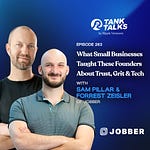This week in the Tank we have Winter Mead, founder of Coolwater Capital, to discuss his background in venture capital and the challenges faced by emerging fund managers. He emphasizes the importance of understanding the LP perspective and operationalizing the fund to attract institutional investors. Winter also shares insights from his book on raising a venture capital fund and the mission of Coolwater Capital's Accelerator program. The program aims to bridge the knowledge gap for emerging VCs and provides guidance on fund formation, LP fundraising, and fund management. Winter highlights the criteria for selecting VCs for the program and the focus on community orientation.
The conversation covers three main themes: fund management and operations, fundraising, and the future of venture capital. Winter emphasizes the importance of setting up the operations of a fund correctly, learning the new language of being a fund manager, and understanding the market when it comes to fundraising. He also discusses the benefits of building a network and leveraging relationships in the venture capital industry. Winter shares their thoughts on the future of venture capital, including the potential for consolidation, the role of AI in fund management, and the continued focus on investing in big themes and challenges.
And John Ruffolo and Matt Cohen discuss the week’s news.
About Winter Mead:
Winter Mead is the founder and managing member of the investment firm Coolwater Capital. The firm focuses on emerging managers and technology investments. He is author of How To Raise A Venture Capital Fund, and operates Coolwater, an academy for training, building and scaling emerging managers. Coolwater has worked with over 240 emerging managers in the last four years.
Prior, Winter helped build and invest an evergreen fund at SAP, a publicly listed enterprise software company, where he co-founded the LP transparency movement called #OpenLP. Winter also worked as a private equity and venture capital investor at a large multi-family office in San Francisco. Winter has completed seventy-nine institutional investments, as well as over twenty-five other investments since leaving his institutional allocator role. He served as junior faculty at Stanford Graduate School of Business on Venture Capital and Entrepreneurship.
Winter holds a Master of Science degree majoring in Management Research from the University of Oxford and a Bachelor of Arts degree from Harvard University.
In this episode, we discuss:
(02:06) John Ruffolo discusses the potential political motivations behind not including a higher capital gains tax in the recent budget proposal and how it might be a strategic move by the government to pressure the conservative opposition
(02:29) A potential second reason for the omission might be a need for more time to draft detailed rules around the new capital gains strategies, suggesting it's still a work in progress
(03:35) The governmental challenges in managing the budget and public expectations, highlighting the difficulty in aligning political strategies with economic needs.
(06:01) Concerns about the impact of unrestricted immigration on housing markets, criticizing the government for not addressing the core issues of housing supply.
(07:34) The need for national unity and economic growth rather than redistributive measures that pit different societal groups against each other.
(12:40) Llama 3 might cause disruption in the AI model market, praising its rapid adoption and potential to democratize high-quality AI tools
(16:34) Winter Mead describes the mission of Coolwater Capital as supporting emerging managers, detailing how the firm aids them through training and network building to establish and grow their funds.
(17:24) Foundational experiences at Sapphire Ventures that led him to focus on venture capital, highlighting the importance of understanding the investment landscape and operational aspects of managing a fund.
(19:39) Discusses the importance of creating educational resources like his book to help emerging managers navigate the complexities of VC funding, emphasizing the lack of consolidated knowledge in the field
(23:26) The challenges of fundraising for new funds, including the necessity of aligning with the right LPs and understanding the fundraising environment to effectively position a new fund in the market
(24:32) The reasons behind writing his guidebook, aimed at solidifying his understanding of venture capital and offering a structured tool for new fund managers to increase their probability of success
(28:07) The inception of Coolwater Capital and its strategic focus on providing a scaffolding to support emerging VC managers through both the fundraising process and fund operations
(30:40) The operational complexities of running a venture capital fund, from compliance and management to investor relations, underscoring the importance of operational efficiency for fund success
(34:27) The long-term commitment required to manage a venture fund, urging potential fund managers to evaluate their dedication to the operational demands of fund management beyond just investment activities.
(36:36) The importance of creating educational resources for emerging managers and the necessity of operational excellence
(40:09) The challenges new fund managers face, such as aligning with the right LPs, understanding market positioning, and the importance of strategic planning in the early stages of fund development
(47:25) Speculating on the future of venture capital, discussing potential trends such as the increasing role of technology and the likelihood of more consolidation in the industry as firms seek to scale and enhance capabilities
Fast Favorites:
🎙- Favorite Podcast: Acquired
📰- Favorite Newsletter / Blog: Strictly VC, Term Sheet
📲- Favorite Tech Gadget: Phone
📈- Favorite New Trend: Bigger firms buying smaller firms
📚- Favorite Book: Pioneering Portfolio Management
🤔 - Favorite Life Lesson: Doing something for so long that it sheds your ego
Follow Matt Cohen and Tank Talks here!














Share this post